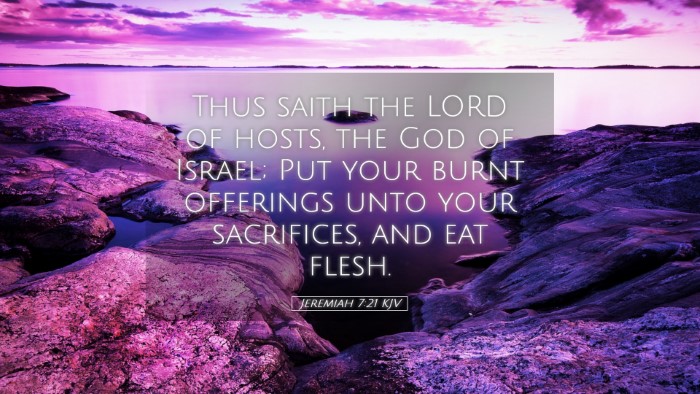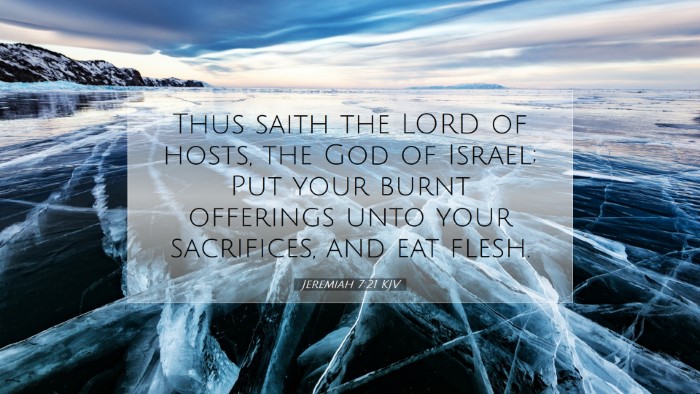Commentary on Jeremiah 7:21
Jeremiah 7:21 presents a powerful exhortation from God through the prophet Jeremiah, emphasizing the necessity of obedience to God’s commands over mere ritualistic worship. The verse states:
"Thus saith the LORD of hosts, the God of Israel; Put your burnt offerings unto your sacrifices, and eat flesh."
Contextual Background
This verse is situated within a broader narrative where God critiques the people of Judah for their false sense of security rooted in religious rituals rather than genuine faith and obedience. The temple had become a place of sanctuary for corrupt practices, and the Israelites believed their sacrifices were sufficient to appease God despite their disobedience.
Theological Insights
Three core theological themes arise from this verse:
- The Importance of Obedience: God prioritizes obedience over sacrifice. The burnt offerings were intended as acts of devotion, yet without the accompanying moral and ethical conduct, such offerings were rendered meaningless.
- Critique of Ritualism: The reliance on sacrifices as a means of securing God's favor became a significant issue. This mirrors the contemporary challenges faced by believers today, who may fall into the trap of routine actions devoid of true devotion.
- Divine Demand for Authentic Worship: Genuine worship must stem from a heart of obedience that aligns with God's will. This principle emphasizes that true honor to God encompasses leading a life reflective of His commandments.
Commentary from John Gill
John Gill notes that the phrase “Put your burnt offerings unto your sacrifices” underscores the idea that exhaustive ritualistic practices alone do not satisfy God. Gill emphasizes that God desires the hearts of the worshippers rather than mere external conformity to sacrificial laws. The "eating of flesh" refers to the common practice of consuming parts of the sacrificial animals, which Gill interprets as an important act of dedication and sharing in God’s provisions, but it necessitates a right heart before God.
Insights from Matthew Henry
According to Matthew Henry, this command reveals the futility of substituting outward sacrifice for obedience and righteousness. Henry reminds readers that God cannot be appeased by external forms if the heart remains untouched. He asserts that God desires true repentance and moral integrity. The prophet uses strong language to suggest that God would rather the people stop their sacrifices if committed hypocrisy is at the core of their actions.
Albert Barnes' Perspective
Albert Barnes further expands upon the idea that God’s primary concern is not the sacrifices but the obedience of His people. Barnes explains that this message applied not only to ancient Judah but resonates throughout biblical history, indicating that the principles of sincere worship remain timeless.He argues that the sacrifices made were of no value when the people were unfaithful in their daily walk with God that included ethical living and social justice.
Adam Clarke on Sacrifices and Obedience
Adam Clarke focuses on the contrast between the offerings and the required obedience. He stresses that while sacrifices are a form of worship, God demands a complete offering of oneself – a life that aligns with His laws. Clarke elaborates that the statement to “eat flesh” can symbolize the consumption of what is offered in devotion to God, showing that mere external actions should align with internal commitment to God’s commands.
Practical Applications
This examination of Jeremiah 7:21 yields several practical implications for current readers:
- Heart of Worship: Individuals and congregations must constantly evaluate their motives for worship. Are we coming to God with authentic hearts desiring a relationship with Him, or are we merely performing religious acts?
- Consistent Ethical Living: Believers should understand that worship extends into daily life through ethics and practices that reflect God’s character. Acts of justice, mercy, and humility are forms of worship that God cherishes.
- Emphasis on Spiritual Integrity: As shepherds of the flock, pastors and leaders must encourage transparency and integrity within their communities, ensuring that worship is not merely a routine but a transformative and heartfelt experience.
- Restoration of Correct Priorities: The church today is called to return to an understanding that God desires not just our gifts but our very selves. Prioritizing genuine engagement with God’s word and a commitment to living out its truths should underpin all acts of worship.
Conclusion
Jeremiah 7:21 serves as a poignant reminder to the faithful about the nature of true worship that God seeks. The insights drawn from historical commentaries illuminate the importance of aligning our lives with the teachings and character of God. For pastors, theologians, and students of the Scripture, this understanding brings depth to the practice of faith, encouraging not just the outward observance of religious duties but fostering deep-rooted, authentic relationships with God.


